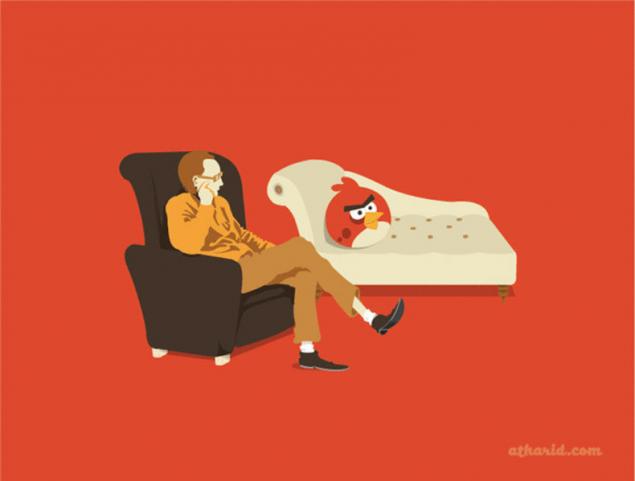347
Overcoming Anger: 15 Simple Ways

Can you remember the last time you were really angry with someone? Were you so angry that you were shaking at the thought of this man? Rarely does anger help us get what we want. It often works against us, causing unnecessary pain. Even the most gentle natures can at some point turn into a vengeful scoundrel if pushed to do so.
Different life situations cause us to experience sadness, pain, disappointment and anger. Words of hate come out of our mouths, even though we would never have thought we could. We cease to be ourselves, the calm and sincere people we are used to seeing. And no, we don't like who we're turning into.
Negative emotions destroy us, we must fight and overcome them. The same method can be used to deal with all negative emotions. To facilitate understanding, we will use anger as a target emotion to overcome. Remember that this method can help you cope with other unfavorable strong emotions, such as jealousy, guilt, hatred, regret and fear.
Why do we feel disgusting?
Anger does not bring pleasant sensations. Frankly, it's a disgusting feeling. Everything within us shrinks, we sweat, we react (instead of acting) in survival mode. Anger clouds our minds, makes us react wildly, relying only on emotions. It happens to all of us. Sometimes the anger is so strong that we get scared of intense hatred directed at other people. And when we cool down, we wonder how we could afford to fall into this state.
The answer is very simple. Let me explain. Emotion is our body’s response to a thought that may be triggered by an external situation. But we look at this situation through the prism of our ideas. And our prism is colored by mental concepts that are unique to each of us, such as good and evil, mine and yours, like – dislike, right – wrong. Remember that we all have different prisms, so conflict is inevitable when interpreting a situation.
For example, if someone loses their wallet, our emotions are not so strong. But if it's our own money, we suddenly start to feel the pain and the urge to reclaim what's lost.
If we have something that we define as our own, we will experience moral discomfort if we realize that we have lost something or risk losing it. No matter what it is. It could be my wallet, my pride, my money, my house, my car, my job, my child, my stocks, my feelings or my dog. As long as we feel lost or threatened with loss, we will experience pain in the form of anger or another strong negative emotion.
We experience pain because we were taught from childhood to think that the things we labeled “mine” are the things that define who we are.
We identify with the thing and mistakenly believe that if we lose it or lose it, we will lose ourselves. Suddenly, our ego has nothing left to identify with. Who are we? This question is causing our ego great pain.
At heart, we feel entitled to more: more money, more respect, a better job, or a bigger house. And we fail to realize that our minds will always want more. Greed is a mental state akin to drug addiction, which constantly grows, blinds us, distances us from reality, and at the same time convinces us that we are acting wisely.
The usual components of anger:
We believe that we have been treated unfairly. We tell ourselves that we deserve more, and we buy into the fiction that someone has treated us unfairly.
Loss – We feel like we’ve lost something we identified with. Feelings, pride, money, car, work.
Guilt – We blame other people or external situations as the cause of our loss, blame them for being their victim. This guilt is often only in our minds and a product of our imagination. We just can’t see what’s happening from other people’s perspective. We become deeply selfish.
Pain – We experience pain, psychological stress, and anxiety. Pain causes physical reactions in our body that disrupt the natural flow of energy and threaten the state of well-being.
Focus – We focus on the things we don’t want in our lives and energize them by complaining about them and repeating our complaints to those who are willing to listen. This creates a vicious cycle of anger. “We get more of what we focus on.” This is true regardless of the emotion.
The interesting thing is that if there are two angry people who are unhappy with each other, they both feel a sense of loss and injustice. Both feel pain and need to blame the other person. Who's right? Answer: Both are right and both are wrong.
Why should we work on ourselves and overcome our anger?
Negative emotions like anger push our bodies into survival mode, as if telling our bodies, “We’re in danger.” To prepare us for “fight or flight,” a physiological change takes place in our bodies. These physiological reactions interrupt the natural flow of energy in our body, which affects our heart, immune system, digestion and hormone production. Therefore, negative emotion is a kind of toxin for the body, which interferes with harmonious functioning and balance.
Prolonged anger, stress, and undercurrent resentment harm our adrenal glands and immune system. In women, adrenal overload can affect the reproductive organs (uterus, ovaries), causing pathologies that can theoretically lead to infertility.
Isn't your physical and mental health worth more than all the psychological pressures you willingly accept?
Should we respond to our own negative emotions and hurt feelings just to temporarily satisfy our pride?
Anger also clouds our minds, and we begin to devour problems and pain. Instead of abandoning them, becoming free from self-inflicted pain, we make irrational, irrational, harmful decisions that make us regret them. In the case of divorce, for example, legal costs alone can eat up all savings, leaving both parties unhappy and poor. In this case, nobody wins!
Theoretical bases of mood change.
Do you notice how quickly you can fall into a negative mood? Maybe a fraction of a second. On the same basis, we can assume that it will take the same amount of time to become productive. However, the problem is that from an early age, we were trained to remain in an unproductive state. No one taught us how to change our state to a positive one. Often, even our parents did not know this, and still do not know.
When negative feelings arise, we have two options:
To follow the pattern we learned as children, to react and let the negativity consume us.
To tear up the model that has been laid in us and, in doing so, to pave new roads that will create alternative opportunities for us.
In fact, there are three ways to break the behavioral pattern:
Visual – Change your thoughts.
Verbal – Change the way you express your thoughts.
Kinesthetic – Change your physical position.

Okay, now let’s get to practice...
15 Ways to Overcome Anger
Some of these methods may be more effective for someone, for someone less. For me, “Look up!” is the most effective way (which is why it comes first on this list). I also noticed good results when using several of these methods.
1. Look up!!!
The fastest way to change negative feelings and overcome anger is to instantly change our physical position. The easiest way to do this is to change the position of the eyes. When we are in a negative state, we are more likely to look down. If we look sharply upward (relative to our visual plane), then we interrupt the negative model of immersion in the quicksand of negative emotions.
Any sudden change in physical position will help:
Stand up and stretch, while emitting a discernible sigh.
Change the expression, work with facial expressions.
Go to the window illuminated by the sun.
Make 10 jumps in place with a change in the position of the hands and feet
Dance a funny dance to make fun of yourself.
Massage your neck from behind with one hand and sing “Happy Birthday” at the same time.
Try doing this the next time you feel negative, or you have an unpleasant thought.
2. What do you want?
Sit down and write down exactly what you want out of the situation. Your task is to describe the final result you would like to see. Be clear, be realistic and honest. Be detailed in your description. Write down dates when you would like to see results.
If you have a clear plan, and you notice that you rank among the negative thoughts you don’t want, you can just focus on that list.
Also, when we consciously do this exercise, we can realize that the random material things we seemed to need are unnecessary.
3. Eliminate from your speech: no, no.
Words like “no,” “no,” “can’t” make us focus on what we don’t want. Language and speech have great power and can influence our subconscious mind and our senses. If you find yourself using a negative word, consider if you can replace it with another positive word. Instead of saying “I don’t want war,” say “I want peace.”
4. Find the light.
Darkness disappears only when light appears (for example, light from a lamp or the sun). The negative can also be replaced by positive. Remember that no matter what happens to us on an external level, or how bad things seem to us in our thoughts, we can always choose to speak and see things positively.
I know it's hard to do when you're in a storm of emotion, but I firmly believe we can take something new out of every situation we face.
Find your lesson. Find in a situation an acquisition for yourself, no matter what it is: something material or mental understanding of something new, or personal growth. Find the light so you can get rid of the darkness of your mind.
5. Give way.
Give in to our ego’s eternal need to be right, to blame, to be angry and vindictive. Surrender in the face of the moment. Give in to the craving to worry about the situation. Be careful. Watch your thoughts and learn to separate your thoughts from your personality. Your thoughts are not you. The game will reach its logical conclusion, regardless of whether we succumb to emotions or not. Trust me, the cosmos will follow its course, and what has to happen will happen. If we don’t give in, we will just screw ourselves up for no reason, and as a result, our body will suffer.
6. Zone of influence
When we are in a bad mood, we can easily fall into a vicious cycle of negative emotions. We don’t get better if we’re among people who complain about the same problems. It won't make us feel better.
Find a group of people with a positive outlook on life. If such people are with us, they will remind us of what we already know deep in our hearts, and we can begin to realize the good and positive aspects of life. When we are in a bad mood, we can draw energy from them to rise above problems and negative states.
Just as being with negative people can negatively affect you, being with happy and optimistic people can increase our awareness and help us get out of this unproductive state.
7. The gratitude exercise
Take a notebook and pen and find a quiet place. List (as detailed as possible) everything you are grateful for in your life: what happened in the past or in the present, or what will happen in the future; it can be relationships, friendships, opportunities or material acquisitions.
Fill out the entire page and use as many pages as you have things you are grateful for. Be sure to thank your heart and body.
It’s a simple but underappreciated way to focus on what really matters. This exercise can lift our mood. It also helps us gain clarity and remind ourselves that we have a lot to be grateful for.
No matter how bad things are, we always, absolutely always have something to be grateful for. If anything, we have the gift of life, the freedom to grow, to learn, to help others, to create, to experience, to love. I also realized that quiet meditation for 5-10 minutes before this exercise and visualizing everything on your list after the exercise make the process more effective. Try it yourself!
8. Meditation.
Meditation is mind training. It helps us to calm the noises in our mental space, reduce the number of thoughts, discover the inner wisdom and, above all, it helps us to feel the divine state and remain in it.
No matter what happens to us on the outer level, we have the ability to stay focused, to feel the state of acceptance, the movement of life, calmness and love. When we are in this state, we are rational, and we have the clarity it takes to easily handle any situation with minimal stress on our body.
9. Breathing techniques for relaxation
Most of us have shallow breathing, and air only enters the upper lungs. Deep breathing exercises will help our brain and body get more oxygen. Try this:
Sit right on the chair, or stand up.
Make sure that clothes do not press anywhere, especially in the stomach.
Breathe in. Breathe out.
Put one hand on your stomach.
When you breathe in, feel your hand lift as air fills your lungs all the way to the diaphragm.
When you breathe out, feel your hand return to its original position.
Mentally calculate your inhalations and exhalations, gradually align them so that both inhalation and exhalation last the same number of bills.
Gradually add another bill on the exhale.
Continue to add the exhalation bill until the expiration time is twice as long as the inhalation.
Repeat this breathing rhythm 5-10 times.
Keep your eyes closed and keep quiet for a few minutes after this exercise is over.
10. Laugh!
We cannot laugh and be upset at the same time. When we make the physical movement we need to laugh or smile, we instantly begin to feel cheerful and carefree.
Try it right now: smile at your most wonderful smile. I need the most sincere and broad smile! How are you feeling? Did you feel an immediate rush of joy? Have you forgotten about your problems for a while?
Make a list of movies that make you laugh and keep them at home. Or meet a friend who has a sense of humor and can make you laugh.
11. Forgiveness.
I say that to all my vengeful little scoundrels. I know that the thought of forgiving your “enemy” seems counterintuitive. The longer you harbor anger, the more painful emotions you will experience, the greater the strain on your body and the more damage you will cause to your health and well-being in the long run.
Not being able to forgive someone is like drinking poison and waiting for the enemy to die. Only that will never happen.
12. Click the elastic gum.
Always wear an elastic rubber band on your wrist. Every time you notice a thought that might lead you into a dull negative cycle, click the rubber band. It might hurt a little. But it does teach our minds to avoid such thoughts. Pain is a great motivational factor.
13. Identify and get rid of your triggers
Sit down and use brainstorming to write a list of signaling words and activities that evoke this negative emotion. Maybe it’s the word “divorce,” or someone’s name, or going to a particular restaurant.
Give yourself your word that you will eliminate any mention of these triggers in your life. If we know something is going to upset us, why would we let it happen?
14. Determine for yourself what anger carries.
Write down what you did when you were angry. When you’re done with the list, go through it and count the number of positive items that actually contribute to your well-being. Yes, and furthermore, “the desire to make another person suffer and experience pain” is not considered “contributing to your well-being.”
This exercise helps us bring more awareness, rationality and clarity to the situation.
15. Strive for completion. Solve the problem.
Do not delay the situation just to “win” or “prove your case”. This is not reasonable for any of the parties involved.
Just because we succumb to external events and consciously choose not to pay any attention to them does not mean that we sit comfortably and let others trample on us.
Take steps to help you take the next step and bring the problem closer. Be proactive and reasonable. The sooner you solve the problem, the faster you can free yourself mentally.
Source: justpost.com.ua























